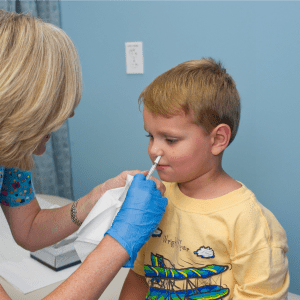Could reforms to GP incentives help boost vaccination take-up?

GP immunisations could be set for an overhaul. An interim review by an NHS England advisory group recommends reforms to the GP contract to help boost uptake of immunisation schemes, including broadening the range of vaccinations that carry incentives for GP practices.
Other recommendations include reforming the payments system for the MMR scheme, and providing practices with greater clarity on what is expected of them alongside improved data to show them how they are performing.
But GP experts have warned these may not be enough to bring real change.
And it comes at a time when GPs are being hamstrung in their efforts to carry out flu vaccinations due to nationwide shortages (see box, below.)
The review was commissioned in response to falling vaccination uptake in recent years, culminating in the suspension of the UK’s ‘measle-free’ status by the World Health Organization.
Also, earlier this year, official figures revealed that coverage for all 13 childhood vaccinations in England, including MMR, had fallen for the fifth consecutive year.
The advisory group, which included representatives from the BMA GP Committee, the RCGP, NHS England and the Royal College of Nursing, concluded the current childhood incentive scheme targets of 70% and 90% coverage were ‘misaligned’ to WHO-recommended levels for population protection. These include, for example, coverage of 95% or higher for three doses of DTP-containing vaccine.
The proposals for GP vaccinations
• Consider broadening the range of vaccines included in any incentive scheme to support uptake
• Consider the potential for incentives to be aimed at primary care networks in the future
• Simplify payment structures, including giving ‘greater weight to item-of-service payments’ for the MMR scheme in particular
• Align incentive scheme targets to WHO-recommended coverage levels
• Clarify what is expected of practices
• Improve data to make it easier for practices to assess their performance
Under existing contractual arrangements, GPs are offered incentives for three childhood vaccines: MMR; meningitis C; and diphtheria, tetanus, poliomyelitis, pertussis and Haemophilus influenzae type b – alongside flu vaccination for four at-risk groups. The review recommends widening this range.
It also says the current MMR ‘mixed payment model’ – which includes payments through the global sum, item-of-service payments and incentives – ‘can make it challenging for practices to monitor and model income and activity’.
This is set to have repercussions for the GP contract. BMA GP Committee chair Dr Richard Vautrey, a member of the advisory group, says the GPC ‘looks forward to discussing further some of the ideas in this report with NHS England in the near future’.
GPs are working hard to vaccinate patients.. but we must reverse falling uptake rates
Dr Richard Vautrey
Dr Vautrey adds: ‘GPs and their teams are already working hard to ensure all patients who need vaccinations receive them, but we do recognise more must be done to reverse the falling uptake rates.
‘While much of this is about reliable, trustworthy information, we must also look at present systems to ensure they are reliable, convenient and straightforward for patients and practices.’
However, GP and professor of primary care at Imperial College London Professor Azeem Majeed, who published a review of immunisation in children, says incentives may not work.
He says: ‘There is certainly a problem with low childhood vaccination rates in many parts of England. Measures that would improve uptake of childhood immunisations are therefore important.
Asking GPs to take on yet more work is not a very effective strategy in the current climate
Professor Azeem Majeed
‘One key issue that needs to be addressed is general practice workload. Asking GPs and their teams to take on yet more work is not a very effective strategy in the current climate. Extra work should be funded at its true cost and should not just be a nominal amount, as is often the case with GP incentive schemes.’
Lancashire and Cumbria LMCs chief executive Peter Higgins is ‘not convinced the proposals will make much difference’. He says: ‘Take-up of vaccines is largely driven by population attitudes, beliefs and understanding. There is little practices can do – national campaigns are needed to make any dent in this.
‘Simplifying payment structures and improving incentives may help GPs’ state of mind but won’t increase uptake.’
How flu vaccine shortages are hitting GP practices
GPs were last month told that vaccine shortages could mean they would have to vaccinate children who would have normally received their flu vaccine at school.
Public Health England said there was a delay in delivery of the childhood nasal spray flu vaccines, affecting a quarter of all stock.
This left some schools unable to vaccinate their pupils. PHE head of immunisation Dr Mary Ramsay said: ‘Children who have underlying medical conditions that make them more vulnerable to flu will be prioritised by GPs first.’
PHE had earlier told GPs to ‘only order vaccine needed for the forthcoming week and to avoid stockpiling’, following the delays to the flu nasal vaccine supply.
Pulse July survey
Take our July 2025 survey to potentially win £1.000 worth of tokens

Visit Pulse Reference for details on 140 symptoms, including easily searchable symptoms and categories, offering you a free platform to check symptoms and receive potential diagnoses during consultations.











